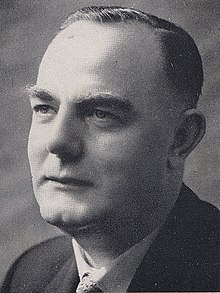BJ Vorster
| B. J. Vorster | |
|---|---|

President Balthazar Johannes Vorster
|
|
| 4th State President of South Africa | |
|
In office 10 October 1978 – 4 June 1979 |
|
| Preceded by | Marais Viljoen (acting) |
| Succeeded by | Marais Viljoen |
| 7th Prime Minister of South Africa | |
|
In office 13 September 1966 – 2 October 1978 |
|
| Preceded by | Hendrik Verwoerd |
| Succeeded by | P. W. Botha |
| Personal details | |
| Born |
Balthazar Johannes Vorster 13 December 1915 Uitenhage, Cape Province |
| Died | 10 September 1983 (aged 67) Cape Town |
| Political party | National Party |
| Spouse(s) | Tini Vorster |
| Children | Elsa Willem Pieter |
| Alma mater | University of Stellenbosch |
| Religion | Dutch Reformed Church |
Balthazar Johannes Vorster (Afrikaans pronunciation: [ˈbaltɑːzar jʊəˈhanəs ˈfɔrstər]; 13 December 1915 – 10 September 1983), better known as John Vorster, served as the Prime Minister of South Africa from 1966 to 1978 and as the fourth State President of South Africa from 1978 to 1979. Vorster was known for his staunch adherence to apartheid, overseeing (as Minister of Justice) the Rivonia Trial in which Nelson Mandela was sentenced to life imprisonment for sabotage, and (as Prime Minister) the Terrorism Act, the complete abolition of non-white political representation, the Soweto Riots and the Steve Biko crisis. He conducted a more pragmatic foreign policy than his predecessors in an effort to improve relations between the white minority government and South Africa's neighbours, particularly after the break-up of the Portuguese colonial empire. Shortly after the Internal Settlement in Rhodesia, in which he was instrumental, he was implicated in the Muldergate Scandal and resigned the premiership in favour of the ceremonial presidency, which he was forced to give up as well eight months later.
Vorster was born in 1915 Jamestown, Western Cape, Union of South Africa, the fifteenth child of a successful sheep farmer. He attended primary school there. Vorster entered Stellenbosch University, known as the "cradle of Afrikaner nationalism" to study law. With six out of the seven prime ministers South Africa between 1910 and 1971 having being students there, its influence on the development of Afrikaner culture has been profound. Vorster involved himself in student politics becoming the chairman of the debating society, deputy chairman of the student council and leader of the junior National Party.
...
Wikipedia
